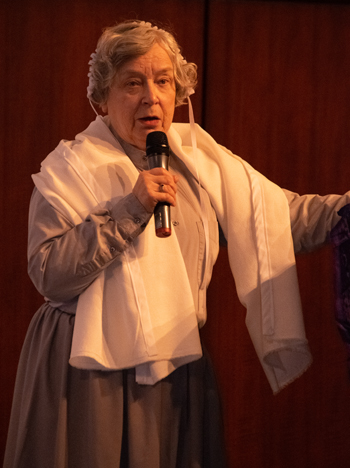VW program celebrates 19th Amendment
DAVE MOSIER/independent editor
Appropriately, celebration of the 100th anniversary of the passage of the 19th Amendment, which gave women the right to vote, brought several local organizations together Thursday evening to honor several of the women credited with making women’s suffrage happen.

The program was held through the auspices of Brumback Library, with the local AAUW (American Association of University Women) chapter, YWCA of Van Wert County, and Van Wert County Historical Society partnering on the project.
Several local women made presentations on the leading figures of the women’s suffrage movement, including Susan B. Anthony, Elizabeth Cady Stanton, Carrie Chapman Catt, Ida B. Wells, and Alice Paul, while Shelley Kotz of the Toledo AAUW chapter impersonated pivotal suffrage movement leader Lucretia Mott.
Interestingly, the path to women’s suffrage led through the anti-slavery Abolitionist movement of the early 1800s.
Nearly all of the important women’s suffrage leaders were also a part of the anti-slavery movement leading up to the Civil War, with Mott, a Quaker who was born in 1793, and her husband, James, involved early on in the Abolitionist movement.
Ironically, the women abolitionists who helped Black men earn the right to vote as part of the 15th Amendment had to wait more than half a century before earning that right themselves. For Mott, that day never came, as she died in 1880.
In addition to Cox, those making presentations on women’s suffrage leaders included AAUW member Deb Kleinhenz, Theresa Mengerink of the Historical Society, local teacher Jennifer Steele Trittschuh, Van Wert Municipal Court Judge Jill Straley, YWCA Advocacy Coordinator Kelly Houg, and high school student Sofia Houg.
In addition to being abolitionists, several of the women suffrage leaders were also Quakers, including Mott and Anthony. The reason for that is the fact that Quakers believed all people to be “equal in the sight of God”, including women and Blacks. The religious sect also encouraged women to speak their minds and to have careers of their own.
In fact, the one thread weaving through all the women’s suffrage movement leaders was their sense of injustice: that women were being unfairly kept from the vote.
The women’s suffrage movement could be said to have started when Mott and Stanton met during an anti-slavery meeting held in London prior to the Civil War. The two women became friends and began talking about how the ills of slavery were similar to the injustices women had to face. At that time, women were considered to be the chattel (property) of men — either their fathers or husbands — with no real rights of their own.
Sofi Houg ended the presentation with the story of how the 19th Amendment was finally ratified August 18, 1920, in Tennessee after 35 other states had already approved the amendment.
In fact, the courage of just one man led to the final ratification, since it appeared the vote was deadlocked at 48 votes for and against passage. However, one man, state legislator Harry Burn, who had been wearing a red rose symbolizing his opposition to the amendment (supporters wore yellow roses), changed his vote at the last minute to give the amendment its final ratification.
When asked later why he changed his vote, which placed him in jeopardy from those opposed to the amendment, Burn noted that, while he had worn a red rose in opposition to the amendment, it was a telegram in his pocket from his mother pleading with him to “do the right thing” that led to his “yes” vote.
The right to vote is something women haven’t taken for granted, with Kelly Houg noting that women are more united on issues than men, especially in the areas of sexual harassment and sexual assault, and are “enthusiastic about voting”.
POSTED: 03/06/20 at 8:42 am. FILED UNDER: News







